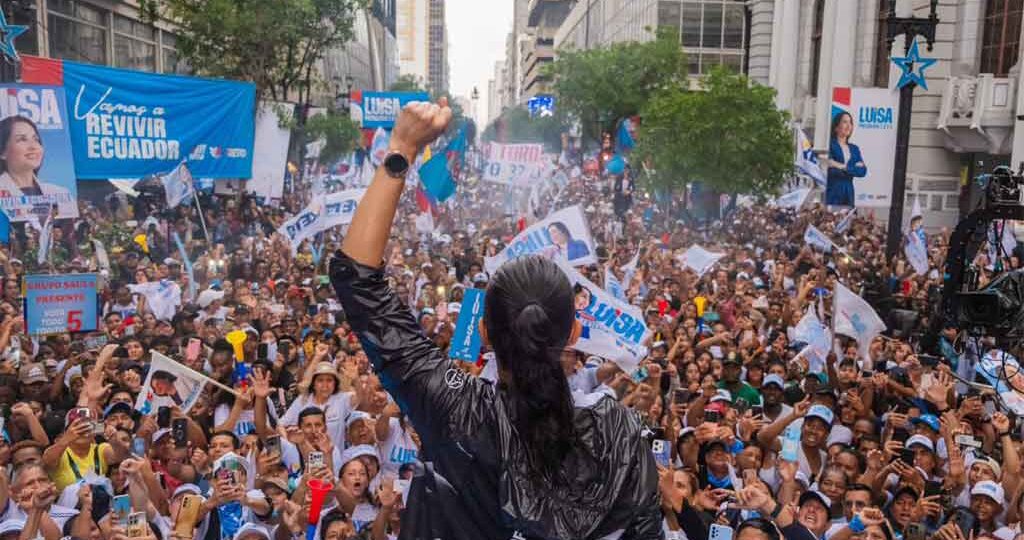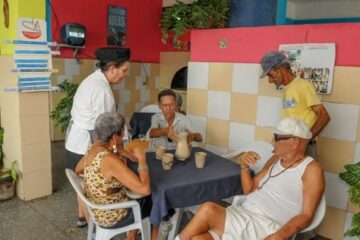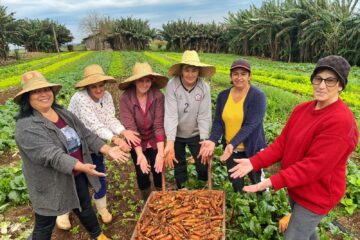“They have fear, we have hope” — this is the slogan that sums up the presidential campaign conducted by Luisa González, of the Citizen Revolution party, for the impending run off elections in Ecuador. After a closely contested first-round ending in a “tie” with Daniel Noboa — a result achieved thanks to the loyal grassroots support from people facing the arbitrary and abusive use of power and public resources by the incumbent president/candidate —, the electoral scenario in Ecuador was defined between progressive forces and the right-wing coalition united around the new National Democratic Action (ADN) party.
The run-off election happening now between these two political actors is different from the 2023 vote. Back then, the vote share in the first round of the election was scattered: Luisa González, the only female candidate, won first place with 33 percent of the votes; Daniel Noboa was surprisingly placed second with 23 percent; and the other six right-wing tickets won the remaining 44 percent of the votes, combined. Meanwhile, in the first round in 2025, while there were twice as many candidates running (16), the vote share was concentrated: 44.17 percent for Daniel Noboa, 44 percent for Luisa González; then, far behind her, Leonidas Iza of the Pachakutik Movement won 5.25 percent, and the other 13 candidates, most of which are right-wing, obtained a combined 6.58 percent of the votes.
It is clear that the right is finding a new reference coalition in an environment that combines the presidential family-corporation, a very feminized and young elite group, and old cadres of failed center-right and right-wing parties that are being recycled. A driver for this relative feminization is associated with the gender parity policy established in the 2008 Constitution (currently in force) and the regulations derived from it.
The oligarchic elite and their followers use fear as a resource to frighten the population in different ways and thus neutralize resistance to their agenda of unlimited ambition for wealth and power. Their tools to induce fear include direct and symbolic violence, lies, persecution, criminalization, material and social destruction, the use of public force for private purposes, and contempt for people’s dignity and lives. On this fear-inducing agenda is the declaration of an “internal war” at the beginning of 2024, enabling all kinds of arbitrariness perpetrated by the government, by sectors that support it for economic or ideological reasons, and by the hegemonic media that sustains its image and project.
Amid this context, this is the second time Luisa González reaches the second round in a presidential election. Should the final results not be subjected to interference, as feared, she will be the first female president of Ecuador. This is a historic step that has become even more significant amid difficult conditions for the “rise and affirmation of women in progressive politics amid unprecedented political violence, with incidents ranging from murder to gendered political violence.”
Fear and hope come together in the election campaign, which formally began on Sunday, March 23rd, with a debate between the candidates. In a polarized scenario, the blatant class and gender bias manipulated by those in power are not only typical characteristics of any electoral campaign, but also signal how much an outcome considered decisive for the fate of the people and the country as a whole is at stake.
Reporting fear and conveying hope was part of the challenge during the debate. González spoke confidently and energetically, occasionally expressing the outrage that the people feel at the critical situation they are experiencing. She appropriately addressed topics included in her proposal to “bring Ecuador back to life,” based on restoring institutions and public investments, tackling head-on the security and violence crisis, prioritizing fundamental rights such as health care and education, and reactivating production. Based on official data, she denounced the escalation of violence, impoverishment and multiple crises endured under the incumbent administration, the negotiations the presidential family has engaged in to trade public goods and resources in favor of companies, the connections between these companies and the new ADN party with drug trafficking, and the many different cases of abusive behavior toward women perpetrated by Noboa — the list is long, including everything from the arbitrary banishment of his own female vice president to the persecution and filing of lawsuits against his ex-wife and her family.
Noboa, in turn, had a boastful, ironic, and smearing attitude. He advocated for his administration using false data, and his proposals were rhetorical and mediocre, alluding to women as beneficiaries. Exposing how he governs on the basis of personal loyalties and relations, he announced an immediate offer of special bonuses for different industries, while claiming to face a tax crisis that prevents him from allocating the appropriate funds to allow basic institutions and services to operate. Whatever the topic was discussed, he repeatedly made false accusations against the Citizen Revolution party, portraying this sector as a group of thieves and drug traffickers linked to Maduro. Absurdity reached its pinnacle when he argued he was being persecuted and criminalized.
This kind of event is designed based on a win-or-lose logic. Most assessments and reviews recognized that González won the debate, and, most importantly, a sense of hope grew among the population. However, after the debate, the mainstream media compared the performance of the two candidates, arguing that neither offered important proposals, that both attacked each other equally, and that González had shown an “aggressive” and “hysterical” attitude. It is not only a way to cover up Noboa’s weak and inadequate performance, but also to treat truths and lies as if they are on the same level, and to undermine the serious policy proposals put forward by a woman.
A week later, on Saturday, March 29th, there was a significant event of hope: in the indigenous parish of Tixán, in the central Sierra, the Citizen Revolution party and the Pachakutik Movement signed the Agreement for Life. The agreement reaffirms a grassroots transformative calling, at a time when calls for unity to “save the country” are divided into two opposing tendencies. The 25 points agreed upon substantially confirm the Citizen Revolution party’s government project, call for defending the Constitution, and aim at immediately restoring social justice. This act was hailed by González as a historic step, an expression of political maturity and love for the people, while the Pachakutik leader emphasized the need to cast “not a single vote to the right.”
Because of the sheer magnitude of this unprecedented crisis, taking a stance has become essential for sectors that may not have a decisive electoral weight, but do take on the symbolic meaning of endorsing a project of change, which is now part of the resistance, but can hopefully be resumed. Unity, long perceived as necessary by the bases at the grassroots, has now been adopted by leaders who are all the while seeking to bring their movements back from inexplicable steering to the right.
While this was happening, the incumbent president/presidential candidate was using public funds to set up a meeting and photo op with Donald Trump in Miami, a place where he was born and often visits, in search of electoral gains. This meeting, like everything else, oscillates on an uncertain boundary between the private and the official, with vague agendas and agreements, yet wicked agreements regarding the installation of US military bases, the expansion of the concept of “terrorism,” and other things.
Behind the electoral terms there are recognized structural battles. This is thus how a woman could become president, a woman who always says she “won’t get there alone.” She is getting there with the women who have spearheaded the most important political movement of the past 18 years, with the women who have opened political pathways of equality in recent and past history, and with all those who ensure the people’s livelihoods and lives, especially in these very troubled times.
It is also a battle for reshaping a society that has partially and dangerously deteriorated into “deceived voters” and even “self-deceived voters,” weakening their own condition as rights-holding citizens, a condition built as the basis and horizon of the Citizen Revolution project. This social memory is what keeps afloat a process that has been relentlessly persecuted and harassed since 2017.
This is about the very existence of a sovereign nation integrated into the region, as control of this small territory is coveted for its strategic resources and geopolitical location. The conditions for the implementation of the full market desired by the far right have advanced dramatically in recent years. From this point on, the risk of reaching a point of no return emerges as a frightening possibility.
References to life as a central concept in a project for a country have been a constant in the two successive phases of recent history. Between 2007 and 2017, change was promoted based on the innovative proposal of good living [Buen Vivir] as an alternative to the evils of neoliberalism. But as this regime returned, the levels of destruction of living conditions, rights, production, public goods, democracy, the social fabric, and peace were such that the perception is that the most basic meaning of life is endangered.
Right now, the first task will be to defend a secure electoral win and gather all allied forces, both national and international, to protect from harassment a government that aims to bring the homeland back to life.
Magdalena León is a member of REMTE (Latin American Network Women Transforming the Economy) in Ecuador.




